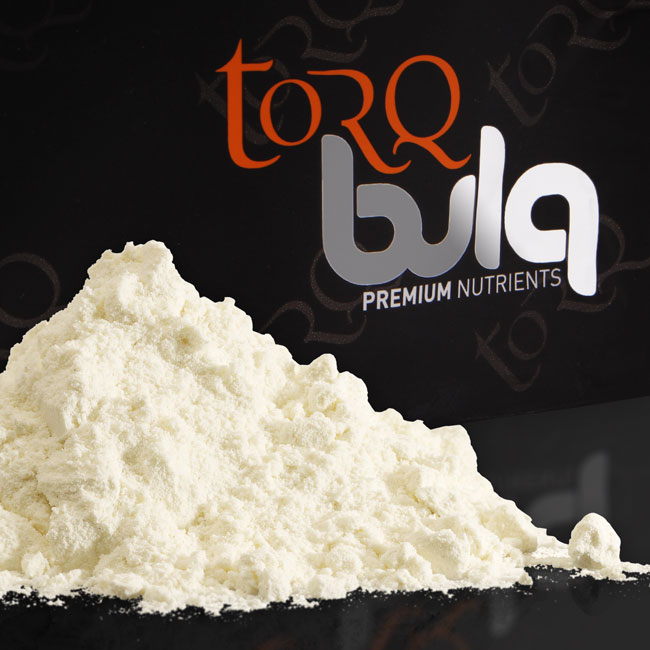Whey Protein Powder (Concentrate)
Product Highlights
- 77% Protein Content
- Reduces Muscle Soreness
- Assists in Post-Exercise Recovery
- Promotes Muscular Adaptation
- Promotes Glycogen Replenishment
- Promotes Positive NET Protein Balance
Product Summary
TORQ Whey Protein Concentrate is rich in amino-acids, which are responsible for the up-regulation of muscle protein synthesis following exercise. Due to Whey Protein Concentrate containing a naturally rich source of the essential amino acid leucine, TORQ Whey Protein Concentrate stimulates protein synthesis greater than other non-whey based protein sources.
Muscle protein synthesis simply means the building of new musculature and energy-producing apparatus found within the working muscles. TORQ Whey Protein Concentrate does not only aid muscular repair and adaptation, but when co-ingested with a rich carbohydrate source, it replenishes muscle glycogen content faster than can be achieved with carbohydrate alone.
Product Usage
1 level scoop provides 15 g of TORQ Whey Protein Concentrate powder, supplying 12g of high quality Whey Protein.
As an athlete/physically active person, you should aim to consume 20-25g of protein every 3-4 hours (5-6 times per day) and this can be achieved through a variety of means including ensuring protein content is sufficient in meals.
30g (2 level scoops) of Whey Protein Concentrate provides 24g of protein and can be added to any food or beverage to help you to achieve this goal. These regular feeding intervals will allow you to meet your dietary protein requirements of 1.4 – 2g per kg of body weight per day, optimising physiological adaptation and maintaining lean muscle mass.
Immediately after heavy exercise, we recommend consuming TORQ Recovery Drink, but when the exercise is more power-based like weight/resistance training or short 15-second intervals, TORQ Whey Protein Concentrate is perfect due to it’s minimal carbohydrate content.
Technical Information
Protein Background: An amalgamation of literature over the past decade has highlighted the importance of nutrition on adaptations to exercise training, with key considerations surrounding type, timing and quantity of protein and carbohydrate ingestion. Protein is essential for roles such as functional (cellular adaption) and structural (muscle fibre) repair post exercise. Furthermore, the role of protein regulates the activity of enzymes, improving the efficiency of cells that allow us to produce energy powering exercise. For any training athlete, the consideration of protein turnover on recovery and adaptation is paramount to performance. Proteins within the body are in a continual state of turnover and for individuals looking for adaptations to training, it is essential that protein synthesis (production) exceeds the rate of degradation (breakdown) through regular feeds of protein.
It is recommended that athletes and physically active people consume 20-25g Protein every 3-4 hours throughout the day (5-6 servings per day).
Proteins are constructed from individual amino acids joined together to create a polypeptide chain. Once a polypeptide chain has undergone various steps of “manufacturing” it becomes a functional protein. With respect to training athletes we acknowledge the role of proteins on muscle structure, function and metabolism and therefore, it is universally accepted that rich sources of dietary protein is paramount to recovery and adaptation. Proteins are constantly being produced and broken down within the human body, however if muscle protein degradation (breakdown) exceeds muscle protein synthesis (production) it results in a negative net protein balance which will ultimately limit and impair adaptations to training.
Muscle protein synthesis is initiated after a signalling molecule (also a protein) detects a change within the cellular environment from rest. This change of cellular environment may be nutritional, hormonal or mechanical (exercise). With exercise, we stimulate both muscle protein synthesis and degradation signalling factors, and therefore, if sufficient protein isn’t available, a negative protein balance will result.
For many endurance athletes, protein is associated with an increase in whole body muscle mass and power, which conflicts with the image of the lightweight endurance-focused athlete they see in the professional arena. However, it must be noted that the required training adaptation is stimulated via the exercise bout and not the dose of protein ingested. Therefore, an endurance athlete may require similar protein quantities as a resistance training athlete but the changes in muscle function will be associated with fuel utilisation and strength rather than muscle size and power.
Research has concluded that when protein and carbohydrate are co-ingested immediately post exercise, the replenishment of stored muscle glycogen content is quicker compared to high carbohydrate alone. Furthermore, the rate of replenishment remains higher for a longer period of time. This finding proposes positive implications for athletes that compete across a multi-stage events where the window for glycogen replenishment post exercise is narrow.
Interestingly, as mentioned above, muscle protein synthesis can be stimulated via regular feeds of 20-25g of protein evenly spaced every 3–4 hours. During periods of high training volume, this method has shown to be effective in maintaining a positive net protein balance. TORQ Whey Protein Concentrate can be used to help you to achieve this goal by filling in the ‘protein gaps’ when a not eating a meal as such.
Also consider TORQ Pea Protein Isolate, TORQ Protein Fusilli, TORQ Protein Orzo and TORQ Protein Crisps.
Protein for Weight Loss: One of the most important components of a weight loss diet is the addition of sufficient protein intake. Protein is one of the most satiating macro nutrients, leaving us feeling full and reducing the dreaded hunger. This helps with diet compliance, one of the most important factors for diet success. Protein also requires the greatest amount of energy to digest and process, equivalent to twice the amount required for fat or carbohydrates. This is referred to as the thermic effect of food and is a component of daily energy expenditure. So, an increase in protein intake can also help to slightly increase total daily energy expenditure.
Weight loss often leads to the degradation of lean muscle mass, which is rarely a desirable consequence, particularly for athletes. The combination of exercise and increased protein intake can prevent this loss of lean muscle mass when in a period of calorific deficit, ensuring performance is maintained. With this approach, weight loss may take a little longer, however, diet compliance will be improved and changes to body composition will be advantageous to performance.
Further Reading: If you’re interested in learning more about protein and the performance benefits of regular daily protein intake, please take the time to read our Protein, Performance and 20-25g Protein Recipes article.
Nutritional Information
Ingredients: 100% Pure Whey Protein Concentrate Powder.
Protein Content: 77%
| per 100g | per 30g serve | |
|---|---|---|
| Energy (kJ) | 1519 | 456 |
| Energy (kcal) | 363 | 109 |
| Fat (g) | 5.0 | 1.5 |
| of which saturates (g) | 0.4 | 0.1 |
| Carbohydrate (g) | 2.6 | 0.8 |
| of which sugars (g) | 2.6 | 0.8 |
| Fibre (g) | 0 | 0 |
| Protein (g) | 77 | 23 |
| Salt (g) | 2.6 | 0.80 |
Allergy Information: See ingredients in bold. Contains Milk. No gluten containing ingredients used.
No Preservatives // No Colours // No Artificial Sweeteners // Suitable for Vegetarians // Wheat Free
If you have any questions about this product or any other on this website, please don’t hesitate in contacting us at enquiries@torqfitness.co.uk or on 0344 332 0852.
Research
- Aragon, A. A., & Schoenfeld, B. J. (2013).
Nutrient timing revisited: is there a post-exercise anabolic window? Journal of the international society of sports nutrition, 10(1), 5. - Areta, J. L., Burke, L. M., Ross, M. L., Camera, D. M., West, D. W., Broad, E. M., … & Hawley, J. A. (2013).
Timing and distribution of protein ingestion during prolonged recovery from resistance exercise alters myofibrillar protein synthesis. The Journal of physiology, 591(9), 2319-2331. - Berardi, J. M., Price, T. B., Noreen, E. E., & Lemon, P. W. (2006).
Postexercise Muscle Glycogen Recovery Enhanced with a Carboyhydrate-Protein Supplement. Medicine and Science in Sports and Exercise, 38(6), 1106. - Ivy, J.L., Goforth, H.W., Damon, B.M., McCauley, T.R., Parsons, E.C. and Price, T.B., 2002.
Early postexercise muscle glycogen recovery is enhanced with a carbohydrate-protein supplement. Journal of Applied Physiology, 93(4), pp.1337-1344. - Macnaughton, L. S., Wardle, S. L., Witard, O. C., McGlory, C., Hamilton, D. L., Jeromson, S., … & Tipton, K. D. (2016).
The response of muscle protein synthesis following whole‐body resistance exercise is greater following 40 g than 20 g of ingested whey protein. Physiological Reports, 4(15), e12893. - Monteyne, A., Martin, A., Jackson, L., Corrigan, N., Stringer, E., Newey, J., … & James, L. J. (2016).
Whey protein consumption after resistance exercise reduces energy intake at a post-exercise meal. European journal of nutrition, 1-8. - Monteyne, A., Martin, A., Jackson, L., Corrigan, N., Stringer, E., Newey, J., … & James, L. J. (2016).
Whey protein consumption after resistance exercise reduces energy intake at a post-exercise meal. European journal of nutrition, 1-8. - Moore, D. R., Camera, D. M., Areta, J. L., & Hawley, J. A. (2014).
Beyond muscle hypertrophy: why dietary protein is important for endurance athletes 1. Applied Physiology, Nutrition, and Metabolism, 39(9), 987-997. - Pasiakos, S. M., Cao, J. J., Margolis, L. M., Sauter, E. R., Whigham, L. D., McClung, J. P., … & Young, A. J. (2013).
Effects of high-protein diets on fat-free mass and muscle protein synthesis following weight loss: a randomized controlled trial. The FASEB Journal, 27(9), 3837-3847. - Tarnopolsky, M. (2004).
Protein requirements for endurance athletes. Nutrition, 20(7), 662-668. - Trommelen, J., & van Loon, L. J. (2016).
Pre-Sleep Protein Ingestion to Improve the Skeletal Muscle Adaptive Response to Exercise Training. Nutrients, 8(12), 763. - Witard, O. C., Jackman, S. R., Breen, L., Smith, K., Selby, A., & Tipton, K. D. (2014).
Myofibrillar muscle protein synthesis rates subsequent to a meal in response to increasing doses of whey protein at rest and after resistance exercise. The American journal of clinical nutrition, 99(1), 86-95.









